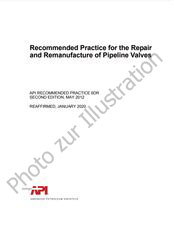Wir benötigen Ihre Einwilligung zur Verwendung der einzelnen Daten, damit Sie unter anderem Informationen zu Ihren Interessen einsehen können. Klicken Sie auf "OK", um Ihre Zustimmung zu erteilen.

API BULL E2-ed.2
Bulletin on Management of Naturally Occurring Radioactive Materials (NORM) in Oil & Gas Production
Name übersetzen
NORM herausgegeben am 1.4.2006
| Zugänglichkeit | Ausverkauft |
| Preis | AUFANFRAGE ohne MWS |
| AUF ANFRAGE |
Informationen über die Norm:
Bezeichnung normen: API BULL E2-ed.2
Ausgabedatum normen: 1.4.2006
SKU: NS-1139443
Zahl der Seiten: 60
Gewicht ca.: 180 g (0.40 Pfund)
Land: Amerikanische technische Norm
*) Bei der Ware, die nicht vorrätig ist und muss bei dem Herausgeber bestellt werden, werden auch die tatsächlichen Transport- und Verpackungskosten berechnet. Die Kostenhöhe teilen wir Ihnen nach Ihrer Nachfrage auf der E-Mail info@normservis.cz, evtl. auf der Telefonnummer +420 566 621 759 mit.
Die Annotation des Normtextes API BULL E2-ed.2 :
API BULL E2, 2nd Edition, April 2006 - Bulletin on Management of Naturally Occurring Radioactive Materials (NORM) in Oil & Gas Production
INTRODUCTION
Naturally occurring radioactive materials (NORM) are present in oil and gas operations at some locations and can deposit in well tubulars, surface piping, vessels, pumps, and other producing and processing equipment. The purpose of this document is to inform oil and gas operators of the possible presence of NORM and to provide relevant information on protecting workers, the public, and the environment. The objective of this document is to provide general information to users so that they have an understanding of the fundamental radiation issues associated with the management of NORM. Issues where the advice of a professional health physicist, industrial hygienist, or other technical expert may be useful are identified and guidance provided. Readers are advised to contact their state regulatory office and work very closely with that office on all NORM issues.
Radiation can result from both man-made and natural sources. Man-made sources include dental x-rays and well logging tools. Natural sources of radiation include the sun (cosmic rays) and radiation from naturally occurring materials found in the earth's crust and in living organisms. Radioactive materials are unstable and decay over time, emitting ionizing radiation. If body tissue or organs are exposed to excessive radiation, biological damage can occur in the individuals exposed or in their descendants, increasing the risk of cancer or birth defects. Thus, it is important to protect humans from unnecessary exposure to excessive levels of radiation.
NORM is found throughout the natural environment and in man-made materials such as building materials and fertilizer, as well as in association with some oil and gas production. NORM found in oilfield operations originates in subsurface oil and gas formations and is typically transported to the surface in produced water. As the produced water approaches the surface and its temperature drops, precipitates form in tubing strings and surface equipment. The resulting scales and sludges may contain radium and radium decay products as well as other uranium and thorium progeny. In addition, radon is sometimes contained in produced natural gas and can result in the formation of thin radioactive lead films on the inner surfaces of gas processing equipment.
Measurements on the outer surfaces of equipment containing NORM usually indicate levels of radiation that are below levels considered to be of concern. When equipment is opened for inspection or repair, inhaling or ingesting NORM can expose personnel to radioactivity. Therefore, in these situations, workers should take precautions to prevent the generation of dust and wear protective equipment. It is also important that NORM waste or equipment containing NORM be managed and disposed by methods that protect the public from unnecessary exposure.
Empfehlungen:
Aktualisierung der Gesetze
Wollen Sie sich sicher sein, dass Sie nur die gültigen technischen Vorschriften verwenden?
Wir bieten Ihnen Lösungen, damit Sie immer nur die gültigen (aktuellen) legislativen Vorschriften verwenden könnten.
Brauchen Sie mehr Informationen? Sehen Sie sich diese Seite an.



 Cookies
Cookies
